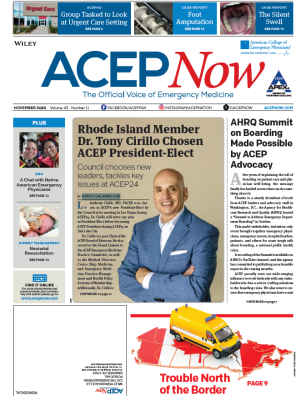WASHINGTON, D.C.—Make no mistake, emergency physicians commit at least some of the elements of a crime every day. Ever touched a patient who didn’t want to be touched? Or restrained a patient who didn’t want to be restrained?
Explore This Issue
ACEP17 Tuesday Daily NewsThe difference for physicians is that their acts almost always lack criminal intent, said emergency physician Hon. Nathaniel Schlicher, MD, JD, MBA, FACEP, presenter of “The New Frontier of Criminal Liability” Tuesday at ACEP17.
“Health care is increasingly under scrutiny from everyone,” said Dr. Schlicher, a former state senator from Washington state. “We’re now about one-sixth of the economy and, like it or not, that draws a lot of attention … common sense will help protect you more often than not.”
Dr. Schlicher suggests five main tips for staying clear of criminal liability.
First, don’t break the law.
“I know it’s common sense, but it does bear repeating,” he said. “Sometimes there will be laws you don’t think about. But as I always tell people from my politics life, if what you’re doing ends up on the 6 o’clock news, would you be proud of it or would you be willing to defend it or just be … embarrassed?”
Second, physicians should document situations in as much as depth as possible, particularly high-risk encounters. Encourage others to document as well so there are contemporaneous notes that can corroborate facts.
Third, have witnesses, particularly for interactions with psychiatric patients and for genitourinary, breast, or other high-sensitivity exams that could potentially result in issues.
“Scribes are my permanent witnesses,” Dr. Schlicher said. “I don’t go anywhere short of the bathroom without them.”
Fourth, physicians should debrief with colleagues after “stressful events” to ensure no one starts apportioning blame later.
And fifth, “do what’s right, not easy.” One example of that was a physician who gave a heroin addict 20 Percocets and discharged them. The recidivist returned with a drug overdose within hours.
The patient lived, but “we’ve got to start having tough conversations with patients about drugs and about the difficult things in their lives, and not just write a scrip for 20 [pills] to get them out of the hospital.”
Dr. Schlicher also told attendees about the case of a 29-year-old psychiatric patient who was suicidal and needed five-point restraints from a critical-access hospital on an island in Washington state. The chief nursing officer (CNO) assisted in the restraint and was then charged with criminal assault. It took a two-week trial for the CNO to be vindicated.
“Imagine that,” Dr. Schlicher said. “You’re doing your job. You’re doing psychiatric care with a physical patient. And you get, at least, sent to court for two weeks of your life and get accused of having assaulted a patient. It’s a nutty world we live in, my friends.”
Pages: 1 2 | Multi-Page




No Responses to “5 Tips for Avoiding Criminal Liability”